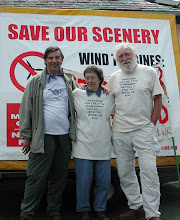Go to bbc iplayer (
Countryfile, about 20 minutes into the programme) to watch John Craven interview Jane and Julian Davis among others about opposition to the wind turbines in the countryside. It was good to hear Jane Davis speak so forcefully about turbine noise, but I found myself annoyed by the programme's focus on the idea (promulgated of course by the Wind Industry and Government representatives like Ed Miliband) that opposition to wind farms is a form of Nimbyism.
One of the best answers to this was in an article by Simon Jenkins, written back in 2003, in regard to the proposal to wind turbines at Whinash. This is an excerpt, and you can read the whole of the article
here "In the calculus of beauty, I would pit the hills of Cumbria, the coast of Devon and Cornwall, the Pennine uplands and the mountains of Wales against any Constable, Gainsborough or Stubbs. They are no less fragile, and currently far more vulnerable. I would not burn a Constable if I were told it might help to save fossil fuel, if only because the benefit would be vastly outweighed by the loss. Nor would I sacrifice the landscapes that Ms Hewitt plans to destroy for so trivial a donation to the cause of global cooling as a few hundred wind turbines.
The Government's thesis that the countryside of upland and coastal Britain is "worth sacrificing to save the planet" is an insult to science, economics and politics. But the greatest insult is to aesthetics. The trouble is that aesthetics has no way of answering back. "
Well, on the artistsagainstwindfarms website, we have done our best to make our answer.. but the other scientific, economic and political arguments are just as powerful, and the Countryfile programme could have given them more weight as well.





